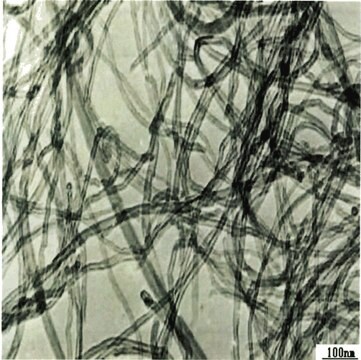755125
Carbon nanotube, multi-walled
carboxylic acid functionalized,>90% carbon basis, D × L 9.5 nm × 1.5 μm
Synonym(s):
Carbon nanotube, multi-walled, carboxylic acid functionalized
About This Item
Recommended Products
product name
Carbon nanotube, multi-walled, carboxylic acid functionalized, thin, extent of labeling: >8% carboxylic acid functionalized, avg. diam. × L 9.5 nm × 1.5 μm
description
carboxylic acid functionalized
Quality Level
Assay
>80% carbon basis
form
powder
greener alternative product characteristics
Design for Energy Efficiency
Learn more about the Principles of Green Chemistry.
sustainability
Greener Alternative Product
extent of labeling
>8% carboxylic acid functionalized
avg. diam. × L
9.5 nm × 1.5 μm
functional group
carboxylic acid
greener alternative category
, Enabling
General description
Application
Deposition (CCVD) process. Applications include Electronics; 1 Sensors; 2 Composites; Energy Storage and Study of Life Science systems.3
Preparation Note
Legal Information
Storage Class Code
13 - Non Combustible Solids
WGK
WGK 3
Flash Point(F)
Not applicable
Flash Point(C)
Not applicable
Regulatory Listings
Regulatory Listings are mainly provided for chemical products. Only limited information can be provided here for non-chemical products. No entry means none of the components are listed. It is the user’s obligation to ensure the safe and legal use of the product.
ISHL Indicated Name
Substances Subject to be Indicated Names
ISHL Notified Names
Substances Subject to be Notified Names
JAN Code
755125-VAR:
755125-BULK:
755125-1G:4548173315072
Choose from one of the most recent versions:
Already Own This Product?
Find documentation for the products that you have recently purchased in the Document Library.
Customers Also Viewed
Articles
Find unique properties & applications of single (SWNTs) , double (DWNTs) & multi walled carbon nanotubes (MWCNTs).
Boron nitride nanotubes (BNNT) are close structural analogs of carbon nanotubes (CNT), which are high aspect ratio nanotubular material, where carbon atoms are alternately substituted by nitrogen and boron atoms.
Professor Rivnay (Northwestern University, USA) discusses using organic mixed conductors as an alternative to efficiently bridge the ionic world of biology with contemporary microelectronics.
Carbon nanotubes (CNTs) have received much attention since their discovery in 1991 by Sumio lijima1 due to their excellent mechanical, electrical, and optical properties.
Our team of scientists has experience in all areas of research including Life Science, Material Science, Chemical Synthesis, Chromatography, Analytical and many others.
Contact Technical Service






